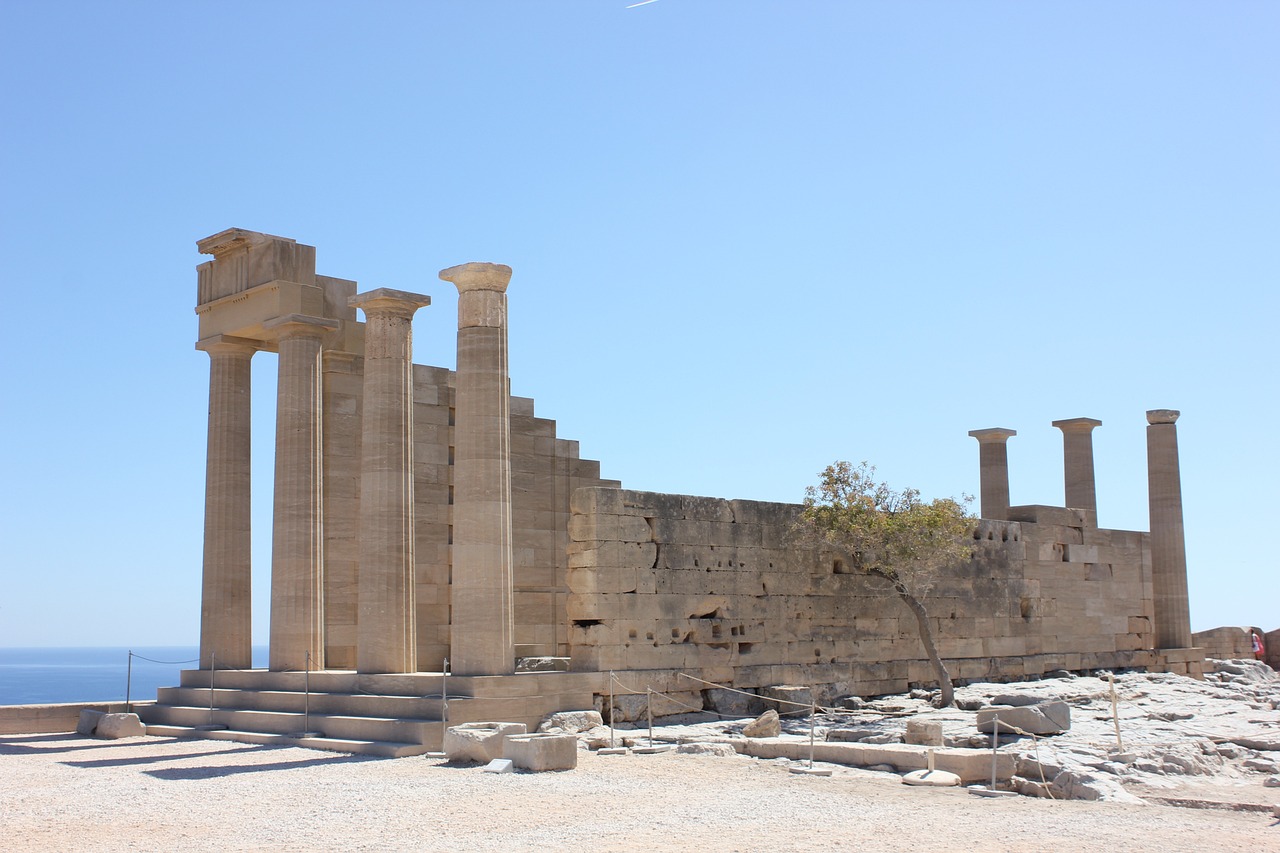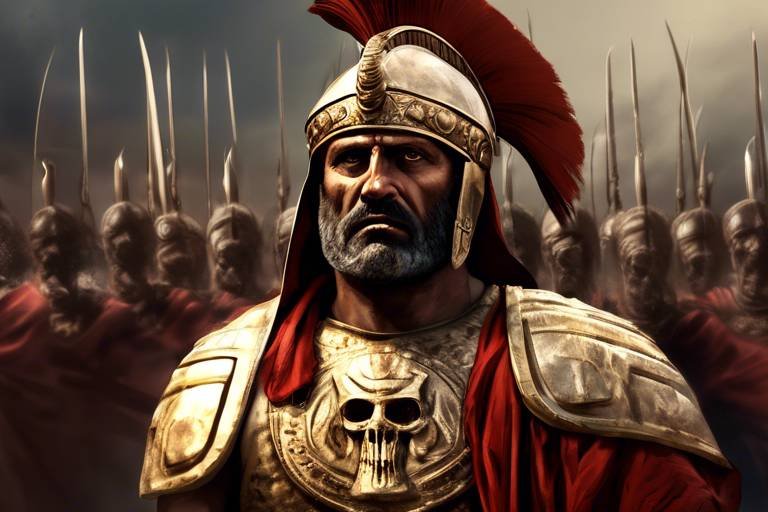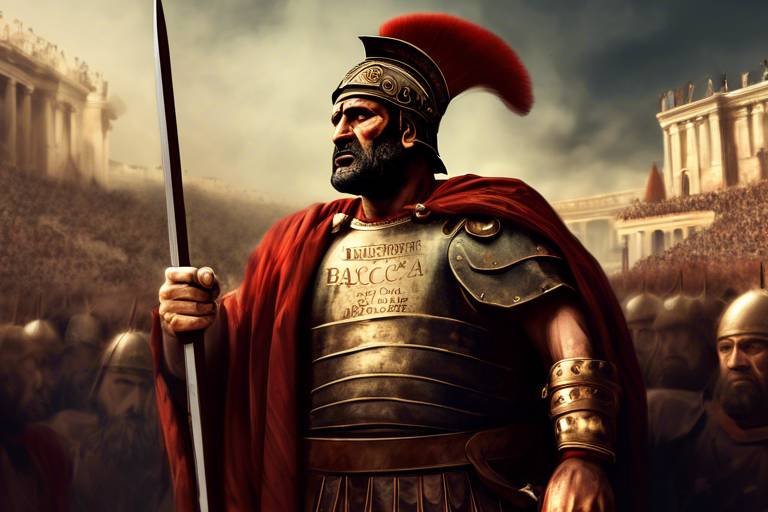Thucydides: The Historian of the Peloponnesian War
Thucydides, an ancient Greek historian, is celebrated for his comprehensive documentation of the Peloponnesian War. His meticulous accounts and insightful analysis of the conflict between Athens and Sparta offer a unique window into the political and military strategies prevalent during that era.

Life and Background of Thucydides
Thucydides, the eminent ancient Greek historian, led a life filled with experiences that profoundly influenced his perspective and approach to documenting the Peloponnesian War. Born in Athens around 460 BC, Thucydides hailed from a wealthy and influential family, providing him with access to education and opportunities that shaped his intellectual pursuits. His background in politics and military affairs equipped him with a unique vantage point to observe and analyze the events of his time.
Thucydides' formative years were marked by exposure to the political intricacies of ancient Greece, particularly during the tumultuous period of the Peloponnesian War. His experiences as a general in the Athenian military and his subsequent exile due to a military failure provided him with firsthand knowledge of the consequences of war and the complexities of power dynamics. These personal experiences deeply informed his historical methodology and narrative style.
Despite facing adversity and political challenges, Thucydides persevered in his quest for knowledge and truth. His commitment to impartiality and accuracy in recording historical events set him apart from his contemporaries and established him as a pioneer in the field of historiography. Thucydides' dedication to seeking the underlying causes of conflicts and the motivations of human actions laid the foundation for his enduring legacy as a historian.

Thucydides' Methodology and Sources
Thucydides, an ancient Greek historian, is renowned for his work on the Peloponnesian War. His detailed accounts and analysis of the war between Athens and Sparta provide valuable insights into political and military strategies of the time.
Explore the life, background, and experiences of Thucydides that shaped his perspective as a historian and his approach to documenting the Peloponnesian War.
Thucydides' methodology in documenting the Peloponnesian War was meticulous and groundbreaking. He relied heavily on first-hand accounts, eyewitness testimonies, and his own observations to construct a detailed narrative of the conflict. Thucydides believed in the importance of verifying information and cross-referencing sources to ensure accuracy in his historical accounts. By combining empirical evidence with critical analysis, he aimed to present a comprehensive and objective view of the war.
Examine the central themes such as power, leadership, morality, and the impact of human nature within Thucydides' historical account of the Peloponnesian War.
Analyze the lasting impact of Thucydides' work on the field of historiography and his influence on subsequent historians and political theorists.
Investigate how Thucydides' writings have been received over time and his enduring legacy in the study of history and international relations.
Examine Thucydides' observations and reflections on the nature of war, power dynamics, diplomacy, and the complexities of political decision-making.
Compare and contrast Thucydides' approach to history with other ancient historians like Herodotus, Xenophon, and Polybius to understand his unique contributions.
Explore how Thucydides' principles and insights continue to be relevant in contemporary contexts, including international relations, conflict resolution, and leadership studies.

Key Themes in Thucydides' Work
Thucydides, an ancient Greek historian, is renowned for his work on the Peloponnesian War. His detailed accounts and analysis of the war between Athens and Sparta provide valuable insights into political and military strategies of the time.
Explore the life, background, and experiences of Thucydides that shaped his perspective as a historian and his approach to documenting the Peloponnesian War.
Delve into Thucydides' unique historical methodology and the sources he utilized to construct his narrative of the Peloponnesian War.
Thucydides' historical account of the Peloponnesian War delves into key themes such as power, leadership, morality, and the impact of human nature. These themes are intricately woven into his narrative, shedding light on the complexities of ancient politics and warfare.
Analyze the lasting impact of Thucydides' work on the field of historiography and his influence on subsequent historians and political theorists.
Investigate how Thucydides' writings have been received over time and his enduring legacy in the study of history and international relations.
Examine Thucydides' observations and reflections on the nature of war, power dynamics, diplomacy, and the complexities of political decision-making.
Compare and contrast Thucydides' approach to history with other ancient historians like Herodotus, Xenophon, and Polybius to understand his unique contributions.
Explore how Thucydides' principles and insights continue to be relevant in contemporary contexts, including international relations, conflict resolution, and leadership studies.
Q: What makes Thucydides' work on the Peloponnesian War significant?
A: Thucydides' meticulous documentation and analysis of the war provide valuable insights into ancient political and military strategies, setting a standard for historical scholarship.
Q: How did Thucydides' approach to history differ from other ancient historians?
A: Thucydides focused on providing detailed accounts based on eyewitness testimonies and rational analysis, aiming for accuracy and objectivity in his narratives.
Q: What are some key themes explored by Thucydides in his work?
A: Thucydides delves into themes such as power struggles, leadership qualities, moral dilemmas, and the influence of human nature on political decisions, offering a nuanced perspective on ancient conflicts.
Q: How has Thucydides' work influenced modern studies in international relations?
A: Thucydides' insights on power dynamics, diplomacy, and the complexities of war continue to shape contemporary understandings of international politics and conflict resolution strategies.

Thucydides' Contribution to Historiography
Thucydides' contribution to historiography is monumental, shaping the way history is studied and understood. His work on the Peloponnesian War marked a significant shift towards a more analytical and critical approach to recording historical events. Thucydides' emphasis on factual accuracy, eyewitness accounts, and the analysis of cause and effect set a new standard for historical writing.
One of the key aspects of Thucydides' contribution to historiography is his focus on the underlying motivations and rationality behind human actions in times of conflict. He delved deep into the psychological and strategic aspects of war, exploring how decisions are made, the consequences of those decisions, and the broader implications for societies and civilizations.
Thucydides' narrative style, characterized by its meticulous attention to detail and impartiality, has been a model for historians throughout the ages. His emphasis on the importance of understanding the context in which historical events unfold has influenced generations of scholars in their approach to studying the past.
Moreover, Thucydides' exploration of power dynamics, alliances, and the complexities of international relations has had a lasting impact on the field of political science. His insights into the nature of power and the role of leadership in shaping the course of history continue to be studied and debated by scholars and policymakers alike.
In summary, Thucydides' contribution to historiography lies not only in his meticulous documentation of the Peloponnesian War but also in his innovative approach to interpreting and analyzing historical events. His work remains a cornerstone of historical scholarship and a testament to the enduring relevance of studying the past to understand the present and shape the future.

Reception and Legacy of Thucydides
Thucydides' work on the Peloponnesian War has left a lasting impact on the field of history and continues to be highly regarded in academic circles. His meticulous documentation and insightful analysis of the conflict between Athens and Sparta have earned him a reputation as one of the greatest historians of antiquity. Over the centuries, Thucydides' writings have been studied, critiqued, and revered for their depth and complexity.
Despite facing criticism and skepticism in some periods, Thucydides' legacy has endured, with many scholars recognizing the significance of his contributions to historiography. His emphasis on the importance of factual accuracy, critical analysis, and the role of human agency in shaping historical events has shaped the way we approach the study of the past. Thucydides' work continues to be a cornerstone of historical scholarship and a source of inspiration for generations of historians.

Thucydides' Insights on War and Politics
Thucydides, the astute historian of the Peloponnesian War, offers profound insights into the intricate dynamics of war and politics. Through his meticulous observations and analyses, Thucydides delves into the essence of conflict, power struggles, diplomacy, and the complexities of decision-making in the realm of politics.
One of the central themes in Thucydides' work is the unyielding nature of power and its influence on human actions. He highlights how the quest for power often drives nations to engage in wars, leading to a perpetual cycle of conflict and competition. Thucydides' keen understanding of power dynamics sheds light on the underlying motivations behind political decisions and the pursuit of strategic interests.
Moreover, Thucydides emphasizes the role of leadership in shaping the course of war and politics. He explores how the actions and decisions of leaders can have far-reaching consequences, impacting the outcomes of conflicts and shaping the destiny of nations. Thucydides' nuanced portrayal of leadership qualities and failures provides valuable lessons for understanding the complexities of governance and decision-making in times of crisis.
Additionally, Thucydides delves into the moral dimensions of war and politics, raising profound questions about the ethical dilemmas faced by individuals and societies in times of conflict. He challenges conventional notions of morality and explores the grey areas where principles clash with pragmatism, shedding light on the ethical complexities inherent in the pursuit of power and national interests.
Thucydides' insights on war and politics extend beyond mere historical documentation; they offer timeless lessons that resonate in contemporary contexts. His analysis of human nature, power dynamics, and political strategies continues to provide valuable insights for understanding modern conflicts, diplomatic negotiations, and the complexities of international relations.
In essence, Thucydides' work serves as a beacon of wisdom, guiding readers through the intricate tapestry of war and politics with unparalleled clarity and depth. His enduring insights transcend the boundaries of time, offering a timeless perspective on the enduring realities of human nature and the complexities of governance in times of crisis.

Comparative Analysis with Other Ancient Historians
When comparing Thucydides to other ancient historians such as Herodotus, Xenophon, and Polybius, it becomes evident that each scholar brought a unique perspective to the field of historiography. While Herodotus is often referred to as the "Father of History" for his narrative style and inclusion of mythological elements, Thucydides stands out for his analytical approach and emphasis on factual accuracy.
Unlike Herodotus, who focused on the broader cultural and social aspects of the ancient world, Thucydides narrowed his scope to the political and military events of the Peloponnesian War. This shift in focus allowed Thucydides to delve deep into the causes and consequences of conflicts, providing a detailed analysis of power dynamics and human behavior in times of crisis.
Xenophon, another contemporary of Thucydides, adopted a more personal and anecdotal style in his historical writings, often interweaving his own experiences into the narrative. In contrast, Thucydides maintained a detached and objective stance, aiming to present events as they unfolded without embellishment or personal bias.
Polybius, a later historian, introduced the concept of cyclical history and the idea of recurring patterns in political systems. While Thucydides focused on a specific period of conflict, Polybius took a more comprehensive approach, analyzing the rise and fall of empires throughout history.
Overall, Thucydides' meticulous attention to detail, critical analysis of events, and emphasis on the rational motivations behind human actions set him apart from his ancient counterparts. His work continues to be studied and revered for its enduring relevance to the study of history and political science.

Modern Applications of Thucydides' Principles
Thucydides' principles and insights transcend the boundaries of time, offering valuable lessons that remain applicable in modern contexts. His profound understanding of power dynamics, conflict resolution, and leadership continues to resonate in various fields, particularly in international relations. By examining Thucydides' principles through a contemporary lens, we can glean insights into navigating complex geopolitical landscapes and understanding the intricacies of diplomatic relations.
One modern application of Thucydides' principles lies in the realm of international relations, where his emphasis on the role of power and self-interest in shaping state behavior remains highly relevant. In a world characterized by shifting alliances and geopolitical rivalries, Thucydides' insights serve as a guiding light for policymakers seeking to navigate turbulent waters and avoid the pitfalls of miscalculation.
Furthermore, Thucydides' observations on the complexities of political decision-making offer valuable lessons for leaders in various fields. By understanding the nuances of human nature and the dynamics of power, individuals in positions of authority can make more informed decisions that take into account the multifaceted nature of conflicts and negotiations.
In the realm of conflict resolution, Thucydides' emphasis on the importance of dialogue and negotiation as tools for resolving disputes remains as pertinent today as it was in ancient Greece. By applying Thucydides' principles of diplomacy and strategic communication, mediators and negotiators can work towards peaceful resolutions that address the underlying causes of conflict and promote long-term stability.
Thucydides' principles also find resonance in the study of leadership, where his insights into the qualities of effective leaders and the challenges they face offer timeless wisdom for aspiring individuals. By reflecting on Thucydides' narratives of leadership in times of crisis, contemporary leaders can draw inspiration and guidance on how to navigate turbulent waters with integrity and vision.
Overall, the enduring relevance of Thucydides' principles in modern contexts underscores the timeless nature of his insights and the enduring legacy of his work in shaping our understanding of war, politics, and human nature.
Frequently Asked Questions
- What is Thucydides known for?
Thucydides is renowned for his detailed accounts and analysis of the Peloponnesian War between Athens and Sparta, providing valuable insights into political and military strategies of the time.
- What are the key themes in Thucydides' work?
Thucydides' work explores central themes such as power, leadership, morality, and the impact of human nature within his historical account of the Peloponnesian War.
- How did Thucydides approach history?
Thucydides employed a unique historical methodology and utilized various sources to construct his narrative of the Peloponnesian War, focusing on accuracy and analysis of events.
- What is Thucydides' legacy in historiography?
Thucydides has had a lasting impact on the field of historiography and has influenced subsequent historians and political theorists with his insights on war, politics, and human behavior.
- How do Thucydides' principles apply to modern contexts?
Thucydides' principles and insights continue to be relevant in contemporary contexts such as international relations, conflict resolution, and leadership studies, highlighting the timeless nature of his observations.



















